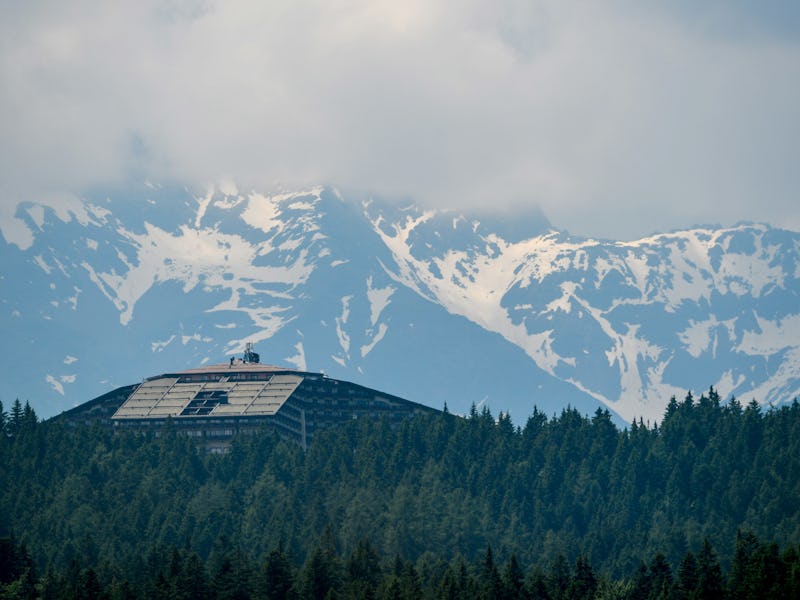Peter Thiel Is Now the Bilderberg Group's Most Prominent Member
Brace yourself for the conspiracy theories.

The long-standing relationship between President-elect Donald Trump and Silicon Valley billionaire Peter Thiel was solidified during a meeting of Silicon Valley brass and right-wing political insurgents with an awkward, finger-clutching handshake. Thiel, who had stumped for and donated to Trump’s campaign, was seated at Trump’s left hand during a summit designed to cut through some of the tensions between the leaders of America’s most powerful technology businesses and the future head of the federal government. Thiel, who’s public support of Trump got him namechecked in a number of Palo Alto shoegaze thinkpieces during the campaign, is considered by his political opponents to be the very model of a modern techno-fascist. The fact that he is openly a member of the Bilderberg Group, which is commonly conflated with the supposed “New World Order,” may amplify concerns as he become a critical part of President Trump’s inner circle.
Thiel’s allegiance to Bilderberg, which seems to have a libertarian bent, makes sense given his wealth and involvement in companies like Palantir Technologies that collect data on civilians. It is not, however, entirely in keeping with the Trump ethos of entertaining conspiracy theories. Bilderberg is a traditional target for Alex Jones of InfoWars and his panicked ilk.
Thiel is not just a part of the group, he’s part of the elite Steering Committee of the annual closed-door meeting where leaders of industry politics, and academia meet to discuss world affairs. This committee decides who will be in attendance — in the past, Bilderberg attendees have ranged from astronaut Chris Hadfield to U.S. Senator Lindsey Graham. Every year fresh invitations are sent.
Proponents of the Bilderberg Group say it’s a special opportunity to discuss current events without the prying eyes of the press. Conspiracy theorists believe it’s a meeting of power brokers, who not only discuss current events but make secret deals to manipulate them. The truth may be somewhere in the middle, but that’s not necessarily going to calm down the extremist members of the press empowered by the Trump’s anti-truth victory. In an InfoWars article about Thiel’s Bilderberg attendance, Jones wrote: “It is the height of hypocrisy to see control freak technocrats shaking their heads at us and saying it’s bad we’re trying to shine a light on the shadow government.”
Peter Thiel arrives at the Hotel Taschenbergpalais Kempinski Dresden for the 2016 Bilderberg Group conference.
Now, compare this description of the Bilderberg group to what Thiel said to reporters in 2016:
“I believe that it is always important to exchange views with people, no matter what their perspectives are. I think we have a lot of problems in our society and we need to be finding ways to talk to people. We need to find ways to talk to people where not everything is completely transparent. Libertarianism is not synonymous with radical transparency. That’s often an argument that Stasi would make in East Germany, when everything had to be monitored by society. And I think you have the best conversations in smaller groups where not everything is being monitored. That’s how you can have very honest conversations and you can think better about the future.”
The most interesting takeaway here is Thiel’s commentary on the importance of transparency. The lack of transparency at Bilderberg underlies the elitism that fuels it. There’s an idea that a certain group of people know what is best for the world and its people, and those ideas have to be hashed out in private before being brought to the populace.
This sounds very similar to the “global power structure” Trump accused Clinton of heading and using to strip the working class of purchasing power, a phrase that Info Wars parlayed into a series of Clinton conspiracy articles. And it is antithetical to Trump’s message that he would topple this elite and replace it with something more transparent.
But Trump’s relationship with members of the global elite has always been peculiar. Pre-election polls demonstrated that Americans thought of Trump as more transparent than Clinton, while reporting at the same time demonstrably showed he was the least transparent presidential candidate in United States history. Since his election, he has continued to decry the concentration of economic power while naming billionaires to his cabinet, which features several known conspiracy theorist. Within this milieu Thiel is unique in at least one way: He’s honest about his participation in a network designed to help powerful people discuss the use of power.